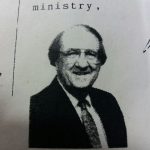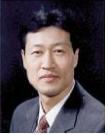#44

 When I read those words, I felt affirmed in our Lay Pastors Ministry for it is grounded in Scriptures: the Mosaic model (Exodus 18), God’s instructions to pastor-teachers (Ephesians 4: 11, 12), and the mandate “tend the flock of God that is your charge” (I Peter 5:1-4).
When I read those words, I felt affirmed in our Lay Pastors Ministry for it is grounded in Scriptures: the Mosaic model (Exodus 18), God’s instructions to pastor-teachers (Ephesians 4: 11, 12), and the mandate “tend the flock of God that is your charge” (I Peter 5:1-4).
You should feel affirmed as well! I believe we are all committed to continue our ministry in creative ways within the framework of Scripture’s eternal verities.
These five propositions, if believed and acted upon, will open a congregation to authentic and effective lay ministry.
GIFTS Since lay people are given gifts by the Spirit for ministry, and are called by God into ministry, they are authentic ministers.
CONTEXT Lay people will be called to ministry and be open to giving and receiving ministry from one another to the degree the whole congregation is nurtured in those Scriptures which deal with gifts for ministry.
EQUIPPING It is only by being equipped that lay people are able to use their gifts effectively in ministry.
STRUCTURE Ministry structures have to be created within which lay people can authentically and effectively minister.
CLERGY To the degree the professional clergy see their role as equipping the saints for ministry, lay ministry will be attractive, authentic and effective.●
COMMENTS
in relation to BELIEVE AND ACT
 Byeong, Melvin University, says:
Byeong, Melvin University, says:
Dr, Melvin mentioned above three scriptures for Lay Pastors Ministry: 1) Mosaic Model (Ex. 18). Pastor-teacher(Ephesians. 4:11, 12) which is function of pastor. And “tend the flock of God..”(1 Peter 5:1-4)
Many Biblical scholars of Old Testaments talk about Mosaic model which is Moses received his father-in-law, Jethro’s counsel.
Yes, pastors know and accept this advice, but they don’t and couldn’t adapt (not everyone) it to the exact place in the church. Generally they used this strategy, but only used it as just slogan.
By the way, before jumping into the right place, right spot in the church, Melvin putted the word Equipping, equipping people to put into there.
I never heard about the terminology Equipping before contacting this ministry. I knew only teaching and training. Once I tasted the concept of Equipping, I think my style and my mind has changed a lot to this concept equipping. What was different to me was that “helping people to grow.” I taught and trained some other people but never thought to make them grow..it was just slogan to me..but once I got equipping concept in my style, changed a lot in terms of my own leadership. This is one of many that I learned from Melvin.
Anyway, Melvin used this scripture Ephesians 4:11-12 which is the role, function of pastor. People have been accepted Mosaic model through preaching, teaching but if they want to put it into reality, they need to be prepared, trained, more saying equipping. That’s why Melvin confessed about his previous pastoring at three local churches. Actually he did not equip people. He just preached it many years, and actually he didn’t equip the church members to do it. So he began to develop this theory into practice, equipping the saints, so every occasions he put the tile “Equipping Seminar” last 30 years and it is still in validity.
Then he moved to next stage, “what equip them for?” He has studied many programs and many ministries in the churches, and also he digged the Bible itself of this issue. The basic questions he had that “what is the purpose of the church”? then he found two from the Bible: Evangelism and Pastoral care. Finally he choose the pastor care (Caring ministry), so decided to do Lay Pastoral Care Ministry which was from 1 Peter 5:1-4.
And he showed us these following Five Propositions in the ministry through his researches, so hope that congregation might open their mind to this ministry.
1) He said about GIFTS first: I think it is related to God. I mean it is the matter between God and us. Melvin related gifts to the ministry directly because God put us into the ministry so they are ministers.
2) And then he mentioned CONTEXT: I think it related to people, also to the church. When we start this ministry, it need to begin with just a few people even though it is big church. Small number of people need to be lay pastors at beginning stage. They and whole congregation need to hear, and need to see what it is, and how it goes among them. We call it “Pilot Project.”
3) Melvin said EQUIPPING: Even people have gifts, they need to equip to be used in the real field. They know their gifts, but if they are not equipping with it their gifts might died in the church because it didn’t find in public and equipped in public to do into ministry. In my experience on equipping seminars at hundred of local churches, they opened mind, glad to find they have caring gifts, and then willing to use it gladly for others.
4) He mentioned STRUCTURE as one of Propositions: It related with LPM System. Melvin referred LPM is the system of congregational care by lay people. So one of staffs in LPM Korea, Rev. Jaekwang Jang, developed LPM System (about 350 pages-power point), even he putted the title, “LPM Solution.” It’s useful but take time to understand and usable in the real field. Anyway Melvin suggested simple structure and showed the diagram in his first book, Can the Pastor Do It Alone? Structure has to be simple in any ministry. Because pastors are busy all the time so better to show them only one or two pages of structure format.
5) Lastly, he talks about CLERGY. It related to the senior pastor directly. This ministry is connect to pastor even it is of lay ministry. Without their fully involvement, it’s not possible to do, and to success of this ministry. If pastor believe it, his congregation believe it. If he see it as important ministry, it is same to congregation.
FOOTNOTES 1
I noticed two words of stressed in above Melvin’s writing: authentic and effective. Why he stressed and repeated a few times? I think he found these two in this ministry which is lay people’s caring is authentic and effective. Correct? Why? lay people is lay people, I mean they are purely ordinary people. They are not professional on this and no obligation to do with money just like professional people. In some sense, pastors are professional. They have studied and get credential to do it. That is professional. So in some sense they might be with this mind just like medical doctor. But lay people are not, and they are different. They approach to the people with pure human being. That’s why Melvin expressed they are authentic so possible to be effective.
FOOTNOTES 2
Dr. Ken Haugh, the founder of Stephen Ministries, mentioned about gifts on caring ministry in his Leader’s Manual. There he show us there are two kinds of gifts:
Managing gift (pastor): Teaching, Wisdom and Administration
Caring gift (caregiver): Mercy, Compassion and Encourage
Second gift are almost same to Melvin. As we see it, two kinds of gift are different which is between the leader of ministry, and just doer of ministry.
Lets look at two cases:
Once I had done Equipping Seminar of PACE at University church in Seoul, its senior pastor, Rev. Hoon Cha, told me he that doesn’t have caring gift but only teaching gift, so he was a little upset about it. Then I explained him there are two kinds of gifts as I wrote above. He didn’t do anything wrong. He is on the right track, then he is relieved.
Another case is one Evangelical church, Rev. Sewoong Na. He has only caring gifts even he is the senior pastor and leader of this ministry. It was good to him but I found there were a little weakness on leadership of the church. So I talk with him many times that they need to find leading person who has administration gifts among Lay Pastors.
Anyway, there should be both gifts to do nicely in this ministry.
 Deb Wolf, Eureka, MO, USA, wrote
Deb Wolf, Eureka, MO, USA, wrote
Changes in Relationship: What is Rejection? Why does it hurt so much? How can you – as a Caregiver help your flock when they are suffering from rejection? How can you face rejection – especially when you are being rejected by the very people that you want to help?
There is LIFE after Rejection. Anyone who has lived and loved has probably felt the heartache of a love or friendship that is not returned. If we pour ourselves out in love, we risk rejection. One thing I know for sure, the wound of a rejection is not something you just “get over”.
Beth Moore, in her Bible Study on Living Beyond Yourself asks, “Who didn’t love you?” A classmate on the playground when you were in 5th grade? A teacher you tried to please? A parent or grandparent? Your boss who felt you never could do anything right? Did you end up eating alone because your coworkers just didn’t accept you? A spouse or a child? Or was it one of your flock members that you tried so hard to help.
REJECTION hurts! The closer the relationship the deeper the wound. Twenty years ago, our family longed to add a third child. We already had a son and daughter, but we felt we weren’t complete without one more member in our family. Joy filled our lives when we adopted a precious baby girl. She was a blessed gift from God and we all loved her so much. We felt certain that in the words of Robert Munsch, God had made us a forever family.
As a young teen she began testing us and eventually her behavior turned to various forms of defiance and rebellion. We were saddened as we watched her make so many self destructive choices. Sadness turned to devastation as her rejection became complete. The day before she ran away from home, she expressed to us, “I know that I am supposed to love you, but I just don’t.” I thought about that for a while and then replied, “That’s O.K., because I have enough love for both of us.”
Her rejection was more painful than we could ever have imagined. We were left with an empty nest, though our daughter still had one more year of high school to complete. Our dreams had turned into a nightmare and we truly felt like our world had come to an end. I entered into a deep depression, and kept repeating over and over, “I don’t know what to do.” Yet I had a deep love for the Lord and knew His love …people had rejected and betrayed him.
What should we do when we experience the pain of rejection? I would like to start with some things we should not do.
* Fill that space with anger or self pity. (Although grieving is very appropriate and even necessary)
* Working extra hard to restore what we have lost. Try to win them back.
* Jump at the first relationship that comes along to “forget our pain”.
* Build walls of protection around our hearts to prevent getting hurt again.
* Use food, alcohol, shopping, gossip or any other “obsession” as a distraction.
* Take our frustration out on those close to us.
When we are so vulnerable, Satan uses other people to offer us a plethora of ungodly choices. James 4:7 says: Submit yourselves, then to God. Resist the devil, and he will flee from you. One thing I have found comfort in was knowing that Jesus not only knew about but also experienced the pain of rejection. 1 Cor. 10:13 says: “No temptation has overtaken you that is not common to man.” Isaiah 53:3 tells us that, “He was despised and rejected by men.”
Our precious Savior knows what it is like to be rejected in every way, by the masses, by individuals and by His own. Jesus understands the painful emotion of rejection, and He alone has the answer for healing that pain. Look at the words in I Peter 2:4; You are coming to Christ, the living stone who was rejected by humans, but was chosen as precious by God. There is comfort in reading those words which remind us that we are chosen by God, the King of Kings and Lord of Lords. His love never fails. Our Heavenly Father loves us and His love will never fail. He has proven that to us through the precious gift of salvation given in Jesus.
Our Father not only loves us, but He knows and appreciates the love we extend to others. He holds it for us in His loving hands. If someone you love has rejected you, the Savior is holding out His loving arms to enfold you. If someone in your Shepherd family rejects you, never give up. Pray for them daily. Keep on loving them.
Although it took many months, our healing is complete. We will always love our precious daughter, and we pray daily to be able to receive her to our open arms once again. How did this healing happen? Where healing always happens … in the arms of the Savior, through Word and Sacrament … surrendering to His.
And there are many names of designation about Lay Pastors. Original name is Lay Pastor, but depend on their situation and theology, they call them differently. So our respected founder Dr. Melvin Steinborn has written on this issue at one of his thirteen monographs, “How we call them.” At there, he understood there are many different names in the local church in the States, but he stressed even they put different name “the rose should be pour out same smell”. For instance, in the States one of the LPM big churches is Frazer Memorial Church at Montgomery Alabama. They adopt this ministry many years ago but they don’t call them Lay Pastor rather call them lay minister.
they call them differently. So our respected founder Dr. Melvin Steinborn has written on this issue at one of his thirteen monographs, “How we call them.” At there, he understood there are many different names in the local church in the States, but he stressed even they put different name “the rose should be pour out same smell”. For instance, in the States one of the LPM big churches is Frazer Memorial Church at Montgomery Alabama. They adopt this ministry many years ago but they don’t call them Lay Pastor rather call them lay minister.
Of course those two names are totally different as you know, but they call it slightly different from original name, in so doing, many other churches are following their style. Of course there was no problem, because they knew the exact meaning of PACE, and what it is, but it is a little harm to the other churches, and also their names are already there. Lay minister, in the other section, so it makes them confused without useless. We have to be careful about how to call them. Of course I understand there is some risk of calling them as a lay pastor. Because people think pastor are those who graduate seminary and ordained person.
ADDITIONAL COMMENT
by BYEONG
Who do you think you are?: Looking at people’s faces and expressions these days, there seems to be a lot of negative trends. At the same time, I think there are many cases where people think negatively and make negative monologues. (negative self-talk). As a result, as everything becomes negative, the personality becomes like that, and it seems to be expressed more and more in that way in interpersonal relationships as well. I think that maybe they can accumulate bad experiences from the past and lament it while looking at themselves.
It is said that there are several factors in the identity of the present me. My identity, which is what determines me, that is “who I am” and “what do they think who I am?” That’s the question.:
1) First of all, [I’m what I’m about] is that I still suffer for myself due to the past or the past environment. This will be an experience for everyone. They might confess, “I couldn’t study well because my family was poor.” “Whether it’s because I was born with a bad head,” or “if I didn’t inherit anything from his parents,” or “if I had a bad score on the IQ test when I was young,” so on, then they would keep thinking negatively and monologue (negative self-talk). “Why am I like this?” “Is this all my life?” and so on. That’s why they don’t become future-oriented and keep clinging to the past. Those things hold us back, and we’re stuck, but in fact that is past and that doesn’t exist anymore. We’re just hanging on to it ourselves.
(2) The second is [the way others talk and see about me]. People who know our bad past keep reminding us and bothering us continually. Therefore, rather than becoming future-oriented, we fall into the current pit and bury it. However, the truth is that this is also their idea, and it is only their view. Our life doesn’t have to be like this or that by a third people. When we look at successful people, they are almost “the people who decided totally their lives.”
(3) The third is that [people decide about me in advance], such as “you’ve been smart since you were young, and you’ll succeed in the future.” This is often the case among relatives. But in a good way, this may be a compliment to the passion, but in another case, it may not be true, and it may be an illusion. Parents’ fantasies sometimes make their children hard, and even as an adult, they often still bother themselves. We’re grateful and glad if it goes well like our parents’ expectations, but if it doesn’t, we often think that my parents’ expectations have made it difficult for me. What’s more serious is that when things don’t work out, it often makes a fool of ourselves. They say often, “he was great when he was young, but why is he like that?” But in the end, this is also a third people’s expectation, not ours. Maybe “it’s already trapped in that frame.” The reality is that there are surprisingly many cases like this.
(4) Finally, [our future is our own.] It is that we must build our future ourselves. Should we be defined by [the past] or [others] who we are today? It is not at all. When we look at very successful people, they don’t become slaves by the past or others, but they choose themselves.
If we think about it a little bit, our life is ours, so we have to take full responsibility and take care of it, so we don’t need to fight with others, but we shouldn’t have to keep in mind forever with their telling and those thoughts. Who is responsible for our own lives? It is 100 percent our own responsibility. I have seen an article that positive and pleasurable people were more successful. To do this, we have to be future-oriented, taking our advantage definitely out of the above negative effects.

DWYS.YWD
오늘 글의 제목은 영어로 되어 있는데, 그 뜻은 “당신이 하겠다고 말한 것은, 그대로 하라”는 것이다. [Do What You Said You Will Do]. 물론 외우기 쉽게 하기 위해 나는 항상 제목의 일곱 글자를 스스로 상기하곤 하는데. 지금도 나에게는 매우 유익함을 발견한다. 수년전에 본 글인데 지금도 내 기억에 생생하고 적용하려고 애쓰고 있다. 말한 약속은 지키라는 것이다. 약속을 무조건 마구 남발하는 경우가 종종 있는데, 특히 교회 내에 소그룹 같은데서 그룹리더는 조심해야 할 사항이라고 본다.
물론 이 문구는 평신도들의 목회적 돌봄 (Lay Pastoral Care)에서 아주 필연적인 것인데, 약속한 것은 지켜야 한다는 것이다. 사람들이 약속을 못 지키는 데에는 몇 가지 특징이 있음을 발견했다. 1) 어떤 사람들은 약속을 잘 안 지키는 것이 습관화된 경우이다. 이런 사람들은 다른 사람들보다 더 자주 그러는데 무의식적으로 그럴 수도 있을 것이다. 2) 어떤 이는 매우 바빠서 약속을 심각하게 여기지 않는 경우이다. 3) 어떤 사람은 립서비스처럼 너무 자주 이런저런 핑계를 대기도 한다.
말을 해놓고 약속을 지키는 것은 중요한 일이지만 종종 소홀히 하기 쉽다. 그것은 큰 실수이다. 만약 그들이 제시간에 그들을 만날 수 없거나, 약속을 지키지 못한다면, 그들은 미리 (적절한 이유로) 알려야 한다. 예를들어 “다음에 만나자” 라고 해놓으면 상대방은 당연히 기다리지 않을까? 그래서 멜빈목사님께서 P.A.C.E. 훈련교재에서 이것을 강조한 이유이기도 하다. 이것은 남을 돌보는 사람들의 ‘자질’에서 중요한 요소이기에 립서비스로 해결될 문제가 아니다.
일본의 유통회사인 SSI의 설립자인 다나카 다카아키(Tanaka Taka-aki)도 성공의 주요 요인으로 말과 행동이 일치해야 한다고 말한적이 있다. 그는 강조하기를, 말하는 대로 하라. 왜냐하면 다른 사람들이 보고 있고, 더 중요한 것은 이것이 당신의 성격을 구성하는 것이기 때문이라고도 했다.
이것은 사실 신뢰성과도 직접적으로 관련이 있다. 만약 우리가 시간약속을 지키지 않는다면, 그것은 신뢰성에 흠집을 낼 것인데, 이는 서로의 관계성을 시작하고, 또 계속 진행하는 데에 매우 기본적이기 때문에, 우리를 시작부터 신뢰하지 않을 수도 있다. 나는 얼마 전에 누군가를 만나기로 했는데, 곧 온다고 하여 밤에 길거리에서 몇 시간을 기다린 적이 있다. 내가 기다리는 줄 분명히 아는 사람인데, 몇 시간후 전화해서 이런 저런 사정으로 집으로 바로 갔다는 것이다. 집에 가서 나에게 전화한 것이었다. 들어보니 상황은 이해되긴 하면서도 나는 매우 불쾌하고 화도 났다. 미리 전화해주었으면 얼마나 좋았을까하고 혼자 생각해봤다. 물론 나중에 제 삼자로부터 안 사실이지만 그런 것이 습관적이라는 것이다. 신뢰성에 흠이 갔다.
그리고 또 다른 하나는 우리가 종종 실수하는 것일 수도 있는데, “당신을 위해 기도할께!”라고 너무 쉽게, 너무 종종 말하는 것이다. 신자로서 우리는 의식적으로 그리고 무의식적으로 이것을 자주 말하지만, 그들은 우리가 정말로 그들을 위해 기도한다고 얼마나 믿는가? 물론 우리는 대부분 그들을 위해 기도하지만, 실제로 우리가 말한 것처럼 그들을 위해 기도하지 않는다면, 그것은 허무하고 단지 ‘립서비스’로 끝난다. 내 말은, 우리는 이런 사소한 것이라도 분명히 의식적으로 사용해야 한다는 것이다.
결론적으로 내가 깨달은 것이 있는데, 우리는 비록 사람들에게 약속을 하지만, 사실은 하나님께도 약속하는 것이 된다. 그분은 우리가 무엇을 말하고, 무엇을 하고, 무엇을 하지 않는지 알고 있다. 사람들에게 뿐만 아니라, 그것이 곧 하나님과의 약속이라는 것도 상기하자.
